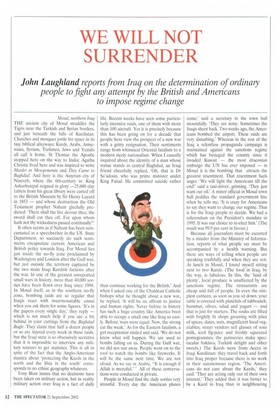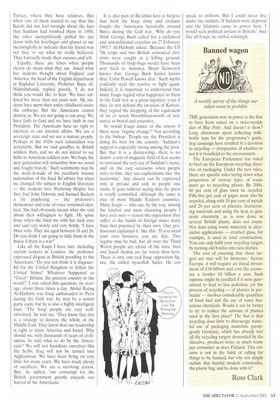WE WILL NOT SURRENDER
John Laughland reports from Iraq on the determination of ordinary
people to fight any attempt by the British and Americans to impose regime change
Mosul, northern Iraq THE ancient city of Mosul straddles the Tigris near the Turkish and Syrian borders, and just beneath the hills of Kurdistan. Churches and mosques jostle for space in its tiny biblical alleyways; Kurds, Arabs, Armenians, Syrians, Turkmen, Jews and Yezidis all call it home. St Thomas the Apostle stopped here on the way to India; Agatha Christie lived here and was inspired to write Murder in Mesopotamia and They Came to Baghdad. And here is the Assyrian city of Nineveh, where the 6th-century BC King Ashurbanipal reigned in glory —25,000 clay tablets from his great library were carted off to the British Museum by Sir Henry Layard in 1853 — and whose destruction the Old Testament prophet Nahum gleefully predicted: 'There shall the fire devour thee; the sword shall cut thee off. For upon whom hath not thy wickedness passed continually?'
It often seems as if Nahum has been reincarnated as a speechwriter in the US State Department, so succinctly do such sentiments encapsulate current American and British policy towards Iraq. For Mosul lies just inside the no-fly zone proclaimed by Washington and London after the Gulf war, but just outside the territory captured by the two main Iraqi Kurdish factions after the war. In one of the greatest unreported small wars in history, more than 40,000 sorties have been flown over Iraq since 1998. In Mosul itself, as in the southern no-fly zone, bombing raids are so regular that Iraqis react with insurmountable ennui when you ask them for some figures. 'It's in the papers every single day,' they reply — which is not much help if you are a bit behind in your cuttings from the Baghdad Bugle. They claim that half a dozen people or so are injured every week in these raids, but the Iraqi state is so obsessively secretive that it is impossible to interview any military sources to get statistics. This is all in spite of the fact that the Anglo-American mantra about 'protecting the Kurds in the north and the Shia in the south' corresponds to no ethnic geography whatever.
Tony Blair insists that no decisions have been taken on military action, but in reality military action over Iraq is a fact of daily life. Recent weeks have seen some particularly intensive raids, one of them with more than 100 aircraft. Yet it is precisely because this has been going on for a decade that people here view the prospect of a new war with a gritty resignation. Their sentiments range from whimsical Oriental fatalism to a modern steely nationalism. When I casually inquired about the identity of a man whose statue stands in central Baghdad, an Iraqi friend cheerfully replied, 'Oh, that is Dr Sa'adoun, who was prime minister under King Faisal. He committed suicide rather than continue working for the British.' And when I asked one of the Chaldean Catholic bishops what he thought about a new war, he replied, 'It will be an affront to justice and human rights. Never before in history has such a huge country like America been able to occupy a small one like Iraq so easily. Before, wars were equal. Now, the strong eat the weak.' As for the Eastern fatalism, a girl receptionist smiled and said, 'We do not know what will happen. We are used to bombs falling on us. During the Gulf war, we did not run away. People went on to the roof to watch the bombs like fireworks. It will be the same next time. We are not afraid. As we say in Arabic, "It is enough if Allah is merciful."' All of these conversations were conducted in private.
People in Mosul find the daily sorties very stressful. 'Every day the American planes
come,' said a secretary in the town halt mournfully. 'They are noisy. Sometimes the Iraqis shoot back. Two weeks ago, the Americans bombed the airport. These raids are very disturbing.' Whereas in the rest of the Iraq a relentless propaganda campaign is maintained against the sanctions regime which has besieged the country since it invaded Kuwait — the most draconian embargo the UN has ever imposed — in Mosul it is the bombing that attracts the greatest resentment. That resentment fuels anger. 'We will fight the Americans till the end!' said a taxi-driver, grinning. 'They just want our oil.' A minor official in Mosul town hall peddles the standard government line when he tells me, 'It is crazy for Americans to say they want to change our regime. That is for the Iraqi people to decide. We had a referendum on the President's mandate in 1995. It was our choice to re-elect him.' (The result was 99.9 per cent in favour.)
Because all journalists must be escorted by a minder from the Ministry of Information, reports of what people say must be accompanied by a health warning. But there are ways of telling when people are speaking truthfully and when they are not. At lunch in Mosul, I found myself sitting next to two Kurds. (The food in Iraq, by the way, is fabulous. In this, the 'land of plenty', local produce is unaffected by the sanctions regime. The restaurants are cheap and full of people. In even the simplest canteen, as soon as you sit down, your table is covered with platefuls of tabbouleh, hummus, olives, salad and yogurt — and that is just for starters. The souks are filled with brightly lit shops groaning with piles of spices, dates, nuts, magnificent local vegetables; street vendors sell glasses of sour milk, iced fig-juice and freshly squeezed pomegranates; the patisseries make spectacular baklava, Turkish delight and other sweets.) The Kurds were from Accra in Iraqi Kurdistan: they travel back and forth into Iraq proper because there is no work in their autonomous region. 'The Americans do not care about the Kurds,' they said. 'They are acting only out of their own interest.' They added that it was better to be a Kurd in Iraq than in neighbouring Turkey, where they have relatives. But when one of them started to say that the Kurds did not feel strongly about the fact that Saddam had bombed them in 1988, the other surreptitiously pulled his eye down with his forefinger and glared at me meaningfully to indicate that his friend was not free to say what he really believed. They hurriedly made their excuses and left.
Equally, there are times when people clearly do mean what they say. Asked what her students thought about England and America, the head of the English department at Baghdad University, Professor Raya AlNakhshabandi, replied gravely, 'I do not think you would like to hear. We have suffered for more than ten years now. My students have spent their entire childhood under the embargo. But the Americans cannot destroy us. We are not going to run away. We have faith in God and we have faith in our President. The Americans have no right to interfere in our internal affairs. We are a sovereign state and we are a mature people. Perhaps in the 1920s such colonialism was acceptable. But we said goodbye to British soldiers then, and we do not intend to say hello to American soldiers now. We hope the next generation will remember how we stood and fought bravely.' Such sentiments may be the stock-in-trade of the peculiarly intense nationalism of the Iraqi Ba'athists; but when we changed the subject to English literature — the students love Wuthering Heights but they find John Osborne and Samuel Beckett a bit perplexing — the professor's demeanour and tone of voice remained identical. She had obviously meant what she said about their willingness to fight. My spine froze when she fixed me with her dark eyes and said very slowly and very firmly, 'I have three sons. They are aged between 18 and 26. Do you think I am going to hide them in the house if there is a war?'
Like all the Iraqis I have met, including asylum seekers in London, the professor expressed disgust at British poodling to the Americans. 'Do you not think it is disgraceful for the United Kingdom to follow the United States? Whatever happened to "Great" Britain, the greatest country in the world?' I was asked this question, on average, about three times a day. Abdul Razaq Al-Hashimi was Iraqi ambassador to Paris during the Gulf war: he may be a senior party cadre but he is also a highly intelligent man. The Iraqi people are very wellinformed, he told me. 'They know that this is a strategy to destroy the whole of the Middle East. They know that our leadership is right to resist America and Israel. Why should we, with thousands of years of civilisation, be told what to do by the Americans? We will not humiliate ourselves like the Serbs. Iraq will not be turned into Afghanistan. We have been living on very little for many years. We have made plenty of sacrifices. We are a surviving nation. But,' he added, 'our contempt for the British government greatly exceeds our hatred of the Americans.'
It is also part of Ba'athist lore to believe that both the Iraqi army and civilians fought the Americans heroically around Basra during the Gulf war. 'Why do you think George Bush called for a unilateral and unconditional ceasefire on 27 February 1991'?' Al-Hashimi asked. 'Because the US 7th corps and two British armoured divisions were caught in a killing ground. Thousands of body-bags would have been sent back to America. Brent Scowcroft knows that. George Bush Senior knows that. Colin Powell knows that.' Such myths evidently steel the resolve to fight again. Indeed, it is important to understand that many Iraqis regard what happened to them in the Gulf war as a gross injustice: even if they do not defend the invasion of Kuwait, they regard the dropping of the equivalent of six or seven Hiroshimas-worth of ordnance as brutal and excessive.
So would Iraqis dance in the streets if there were 'regime change'? Not according to the bishop: 'People say the President is doing his best for the country.' Saddam's support is especially strong among the poor. But that it is a dictatorship, there is no doubt: a sort of magnetic field of fear seems to surround the very use of Saddam's name, and on the rare occasions when people refer to him, they use euphemisms like 'the leadership'. Any dissent can be expressed only in private and only to people one trusts. It goes without saying that the press is totally controlled, although the same is true of most Middle Eastern countries. Many Iraqis — who are, by the way, among the kindest and most charming people I have ever met — resent the oppression they suffer at the hands of foreign states more than that practised by their own. One professional explained it like this: `If you mind your own business, you are fine. This regime may be bad, but all over the Third World people are afraid of the state. Iran and Saudi Arabia are far worse than here. There is only one real Iraqi opposition figure, the exiled Ayatollah Sader. He can speak to millions. But I could never live under the mullahs. If Saddam were deposed and the Islamists came to power here, I would seek political asylum in Britain.' And like all Iraqis, he smiled winningly.











































































 Previous page
Previous page